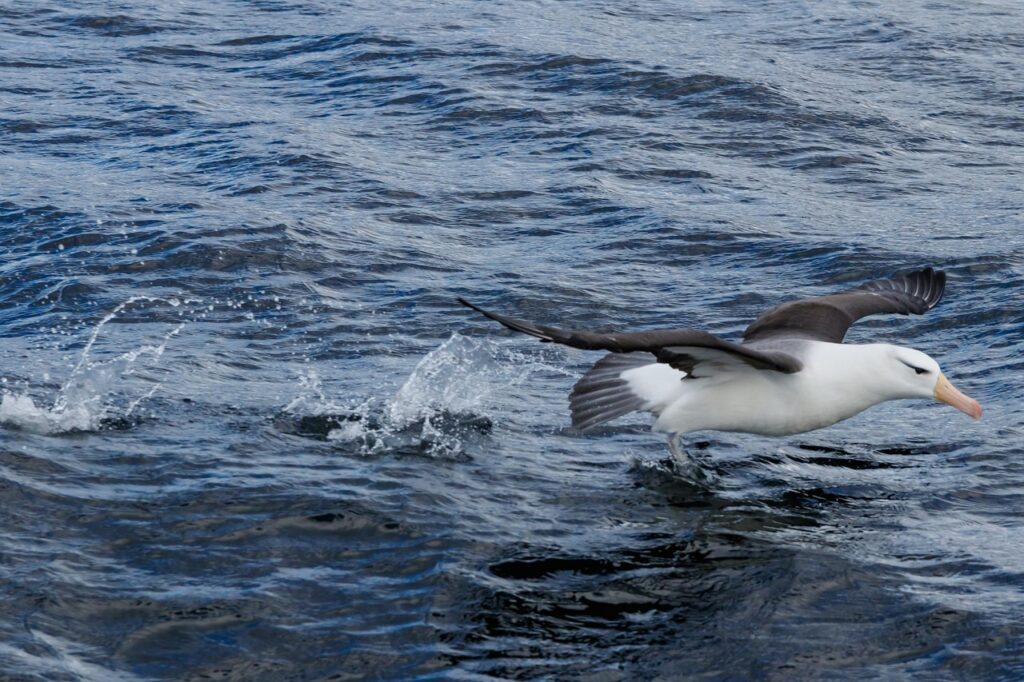Falkland Islands

Black-Browed Albatross
The Falkland Islands don’t feel like the edge of the world — they feel like the quiet part of it. Rolling hills, peat bogs, and skies that never seem to end. The wind is constant, the roads are few, and the silence is broken mostly by wings and waves. This is not a dramatic wilderness. It’s a patient one — windswept, deliberate, and full of life that thrives not by hiding, but by holding on.
Out here, nature is always near. Penguins nest beside sheep fences. Albatrosses ride the updrafts above cliffs. Sea lions sprawl on beaches that feel like they were made for no one but them. You walk, and the land moves — not loudly, but steadily. It’s the kind of place where wildlife doesn’t flee when you appear. It simply glances at you, then gets back to whatever it was doing. That’s the kind of wild this is — familiar, but never tamed.
A Landscape Where Wind Is the Constant
Wildlife That Lives Close — Really Close
Human Presence Feels Temporary
There are towns, yes — and sheep farms, airstrips, and tea with milk. But the wild always feels like it came first. It still does. There’s something strangely comforting about that. No fences around colonies. No need to “look for” animals. They’re already there, watching from dune, cliff, or kelp bed. You’re the visitor. And the land never lets you forget it — kindly, but clearly.
Final Thoughts
The Falkland Islands don’t shout their wildness. They let you find it at walking speed. In the rustle of grass behind you. In the splash of a seal you hadn’t seen. In the wide eyes of a penguin chick mouthing the wind. This is a place that’s easy to underestimate — until it leaves something in you. A quiet kind of wonder. And a respect for what endures, not loudly, but absolutely.
Out here, nature is always near. Penguins nest beside sheep fences. Albatrosses ride the updrafts above cliffs. Sea lions sprawl on beaches that feel like they were made for no one but them. You walk, and the land moves — not loudly, but steadily. It’s the kind of place where wildlife doesn’t flee when you appear. It simply glances at you, then gets back to whatever it was doing. That’s the kind of wild this is — familiar, but never tamed.
A Landscape Where Wind Is the Constant
- Volunteer Point: The iconic king penguin colony — golden-necked, orderly, curious. Thousands of birds line up against wind and sea spray like they’ve always been here. Because they have.
- Sea Lion Island: Remote and rich with life — elephant seals, gentoo penguins, southern giant petrels, and the occasional orca just offshore. It’s wild, but with a softness that invites you to stay still.
- Bleaker Island: Don’t let the name fool you. The skies fill with rockhoppers, skuas, and cormorants. At ground level, tussac grass hides burrows and movement. The air smells like salt and feathers.
- West Point Island: Albatrosses nest beside cliffs, unbothered by footsteps. They preen, bicker, stretch their massive wings. A reminder that grace can live in harsh places.
- Carcass Island: Teeming with songbirds, penguins, and shoreline creatures. One of the few predator-free islands — which means birds here walk and nest with a kind of peace you don’t see elsewhere.
Wildlife That Lives Close — Really Close
- King Penguin: Elegant, expressive, and used to visitors. Often seen in large, dense colonies near flat beaches and grassy dunes.
- Rockhopper Penguin: Spiky-feathered and bold, they leap from rocks with comical confidence. You hear them before you see them.
- Black-Browed Albatross: Wings wide, always watching. These birds own the cliffs and coasts — and always seem to know the wind before it changes.
- Southern Elephant Seal: Massive, muddy, and louder than you expect. Males bellow and snort. Pups blink at you through sand-caked lashes.
- Striated Caracara: Clever, scavenging raptors that stare straight through you — a reminder that intelligence lives in unexpected feathers.
Human Presence Feels Temporary
There are towns, yes — and sheep farms, airstrips, and tea with milk. But the wild always feels like it came first. It still does. There’s something strangely comforting about that. No fences around colonies. No need to “look for” animals. They’re already there, watching from dune, cliff, or kelp bed. You’re the visitor. And the land never lets you forget it — kindly, but clearly.
Final Thoughts
The Falkland Islands don’t shout their wildness. They let you find it at walking speed. In the rustle of grass behind you. In the splash of a seal you hadn’t seen. In the wide eyes of a penguin chick mouthing the wind. This is a place that’s easy to underestimate — until it leaves something in you. A quiet kind of wonder. And a respect for what endures, not loudly, but absolutely.
